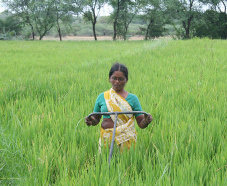 EXPERTS WARN of a grim and uncertain situation in many parts of the world with fast dwindling reserves of the precious commodity, water, coupled with irregular rainfall patterns induced by climate change. EXPERTS WARN of a grim and uncertain situation in many parts of the world with fast dwindling reserves of the precious commodity, water, coupled with irregular rainfall patterns induced by climate change.
“Already a number of problems plague our country’s agriculture and the recent monsoon failure has cast a veil of disappointment and frustration among our farmers.
“Though late, the drought conditions are forcing us to find solutions and ways to overcome such situations in future.
Creating waves
“System of Rice Intensification (SRI), one such method of paddy cultivation, seems to be creating waves all over the world because of its farm based approach to agriculture,” says Dr. Biksham Gujja, Team Leader of the ICRISAT-WWF Project at The International Crop Research Institute for Semi Arid tropics (ICRISAT), Patancheru in Andhra Pradesh.
SRI method guarantees a good yield requiring less water, seeds, fertilizers and more organic matter, since the plants are more resistant to pests and diseases.
Learning to adapt
“Climate change is real and the changing climatic conditions are something which a farmer has to learn to adapt to,” asserts Dr. Gujja.
A visit to Chinnaramancherla village, 10 kms from Jangaon in Warangal district of Andhra Pradesh shows how several farmers practise SRI cultivation despite the acute water shortage and benefit from it.
Every year during this period this entire dry land belt is lush with crops like green gram, groundnut, cotton and many other crops but this year the fields on either side of the road look barren and scorched and several cracks seen on the field surface due to lack of water.
Mr. Siddimalaya, a 65 year old rice-growing farmer turns emotional and says:
Big dissapointment
“We are approaching harvest time, and any further rains now will not help me as this season is lost. Last year, many of my farmer friends lost their crops because of heavy rains and this season they are still awaiting the rains.
“But my only hope is the SRI crop planted in my one and half acres. But for the SRI, in this drought season, with no food and money, my family would be awaiting death. “We are depended on the rice crop for our food throughout the year. I am old, and not eligible for even NREG work. Farming and my fields are my life, that’s all that I have.”
Another farmer Mr. G. Narsi Reddy (mob: 9948360815) says:
“Because of the drought, in conventional rice fields, weed growth is a major problem, also the irrigation requirement in a conventional field is huge as the cracks on the field surface are big and deep.
Power supply
“To top it all, the fluctuation and power supply during summer months is making life more miserable. With no proper timing for the power supply and the force of water (from the irrigating pump) hardly sufficient, it is difficult to inundate the rice fields.”
“The life of a number of farmers in this region is pathetic. Lack of rains means no agricultural activity. This has a direct impact on hay (dry fodder) for their cattle.
Fodder being in great demand at present, several farmers are selling their animals desperately. “There are practically no buyers even if the farmer wants to sell it at a very low price, an ironical situation,” says Manisha Agarwal, Communication Officer with the ICRISAT-WWF Project.
According to Mrs. D. Sugunaamma, in Katkur village:
“ I irrigate my fields once in 4 to 5 days. In one of my SRI fields, the crop had sustained water scarcity for even up to 8 days. I am happy the impact of drought will be less for my family of five.
Expected yield
“We will have both the food and required yield. My crops are growing well and I expect to harvest 50 bags (70 kg each) from my one acre. (During favourable season the yield may even go to 65 bags)."
Several farmers from around the district are flocking to Chinnaramancherla village to personally interact with the SRI farmers.
SRI systems does not require too many labourers or high costs.
For an acre, one requires about eight persons and the cost of cultivation comes to about Rs.5,380 compared to the normal cultivation which requires about 16 persons and costs nearly Rs.10,000,” explains Manisha.
For more information readers can contact Manisha Agarwal, at email: [email protected],
mobile: 9959606667, phone :040-30713766/62.
|